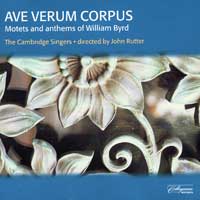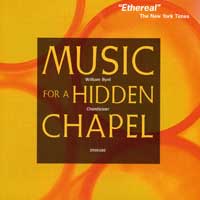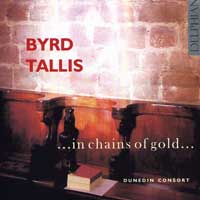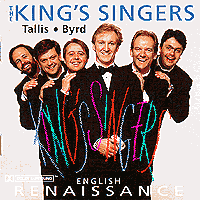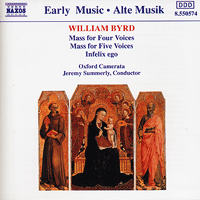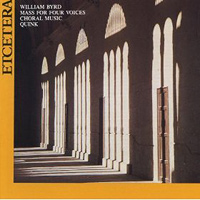In Celebration of the Human Voice - The Essential Musical Instrument
Home | Doo Wop | Barbershop | World | Contemporary | Christian | Vocal Jazz | Choral | Christmas | Instructional | Arrangements
Classical | Opera | Musicals | Personality | Young Singers | Disney | Videos | Songs | The Artists

William Byrd
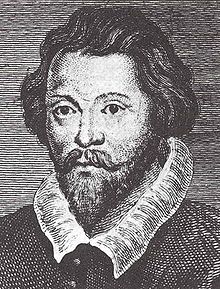
William Byrd (1540? - July 4, 1623) was the most celebrated of early English composers. His entire life was marked by contradictions; as a true Renaissance man, he did not fit easily into categories. He lived well into the seventeenth century without writing songs in the new Baroque fashion, but his superbly constructed keyboard works marked the beginning of the Baroque organ and harpsichord style. Although he was nominally an Anglican court composer for much of his life, he spent his last years composing for the Roman liturgy, and died in relative obscurity. In the anti-Catholic frenzy following the 1605 Gunpowder Plot, some of his music was banned in England under penalty of imprisonment; some of it-such as the Short Service-has been sung in English cathedrals uninterrupted for the past four centuries. |
Arrangements | Recordings
Recordings and DVDs
Displaying 1-6 of 6 items.
Cambridge Singers : Byrd: Motets and Anthems This recording presents a selection of fifteen of the 150 or so Latin motets and three of the dozens of English anthems that, between them, form the greater part of the life's work of William Byrd (1543-1623), the greatest English composer of his era. The chosen motets and anthems represent just some of the many facets of Byrd's sacred music, now recognized after three centuries of neglect as among the most glorious every written for choir. Songlist: Sing Joyfully, Turn our captivity, Praise our Lord, all ye Gentiles, Emendemus in Melius, Siderum Rector, Plorans plorabit, Visita, quaesumus Domine, Attollite portas, Laudibus in Sanctis, Gaudeamus omnes, Ave Verum Corpus, Veni, Sancte Spiritus, Christus resurgens, Solve iubente Deo, O Magnum Mysterium, Non vos relinquam, O quam suavis, Justorum animae Chanticleer : Music For A Hidden Chapel William Byrd and his teacher, Thomas Tallis, were inarguably the greatest composers of Elizabethan England. The primary vehicle for royally-sanctioned musicians of the court was liturgical, and in the court of Elizabeth that would mean settings for Anglican services. However, Byrd was a committed Catholic who nonetheless wrote these masses, motets and antiphons for published volumes titled "Gradualia," volumes I and II. This insurgent act apparently went uncensured, and it is these a cappella works that Chanticleer has recorded here. Given that they would not be performed publicly in a church setting by a large choir, the arrangements are intimate. They are each in the same mode and clef, which therefore creates a mood unbroken, a continuity of feeling that is quietly moving. Songlist: In tempore Paschali, Regina Caeli, In Assumptione Beatae Mariae, Ave Regina Caelorum, Salve Regina Dunedin Consort : In Chains of Gold - Byrd, Tallis Critically acclaimed, this is a recording of William Byrd's Mass for Five Voices, five part motets by Byrd and Thomas Tallis. All the works on this disk are gems of Late Renaissance composition and are beautifully recorded and sung by this young Scottish group who have become one of Scotland's leading performers of Early Music. Songlist: Byrd Prelude In C, O Nada Lux, Laetentur Coeli, Salvator Mundi, Organ Hymn, Mass 5, Kyrie, Gloria, Plainsong, Credo, Sursome Corda, Sanctus, Benedictus, Pax Dominus, Agnes Dei, Organ Hymn, Gaudemus Omnes, O Scrum Convivium, Justorum Animae King's Singers : English Renaissance Thomas Tallis (1505-1585) was the most influential English composer in his day. He lived at Court from 1543 until his death. He survived the coming into dominance of Protestantism during Edward VI's reign, the restoration of Catholicism under Mary in 1553 and the tumultous tussle leading to the Elizabethan Settlement which devised a new church establishment then dominant for nearly a hundred years. Throughout these changes Tallis continued to write choral liturgical music in both the older Latin motet style and the newer English anthem style. His greatest student was William Byrd (1543-1623) who pushed the authorities with his staunch Catholicism but was such a brilliant composer that he never received more than a heavy fine. Elizabeth awarded them the exclusive rights to publish music in her realm, effectively creating a monopoly. The King's Singers bring us a sampling of the huge output from these two most influential composers, including both motets and anthems. These are performed for the joy of those who love renaissance music, with the musical perfection expected of the best. Songlist: Haec Dies, Te Lucis Ante Terminum, Beata Viscera Mariae Virginis, Ave Verum Corpus, Vigilate, Viri Galilaei, Te Lucis Ante Terminum, Lamentations Of Jeremiah, First Set, Lamentations Of Jeremiah, Second Set, If Ye Love Me, O Lord, Make Thy Servant Elizabeth, Our Queen, Sing Joyfully, Laudibus In Sanctis Oxford Camerata : William Byrd The early 1580s marked an important change in the sacred music of William Byrd, just as they did in the history of Catholicism in England. Many of the Latin motets of the 1580s, collected in two volumes of Cantiones sacrae, set words about the Babylonian Exile, charged with penitential ecstasy. These are non-liturgical works - indeed the text of Infelix ego draws on the Bible only indirectly through the pen of savonarola. The words, written as that Catholic puritan demagogue awaited execution in Florence, reflect on his own personal guilt and the redemptive pity of God. They stimulate Byrd's wide technical resources, from two- and three-part writing to complex six-part polyphony to dramatic homophony, the whole reminiscent of the vast Marian antiphons of Christopher Tye or William Mundy. By contrast, the Mass settings are compact and controlled. They belong to a later period, when Byrd's response to his circumstances had changed from the impassioned to the practical; the Gradualia represent an attempt to set music for the entire Catholic liturgy, and the Masses may have been linked to the same project. Songlist: Mass for Four Voices:, -Kyrie, -Gloria, -Credo, -Sanctus, -Agnus Dei, Infelix ego, Mass for Five Voices, -Kyrie, -Gloria, -Credo, -Sanctus, -Agnus Dei Quink Vocal Ensemble : William Byrd Choral Music Acclaimed Dutch vocal ensembles sings the cappella works of William Byrd including The Mass For Four Voices. Songlist: Mass for Four Voices, Gloria, Credo, Sanctus, Kyrie, Benedictus, Agnes Dei, Come to me rief for ever, Retire my soul, Come help O God, Prevent us O Lord, Cibavit eos, Ave verum corpus, Confirma hoc deus, Lustorum animae |
![]() Vocal Harmony Arrangements - Home
Vocal Harmony Arrangements - Home
Christian | Gospel | Standards | Musicals | Specialty | World | Barbershop | Contemporary | Vocal Jazz | Choral | Christmas
Mixed Voices | Female | Male | 8 Parts | 6 Parts | 5 Parts | 3 Parts | 2 Parts | Medleys | Solo | Folio Series | New Releases
Select a Category |
Want to Sing? - Find a Chorus Near You
List of Choruses by State | List of Choruses by City

